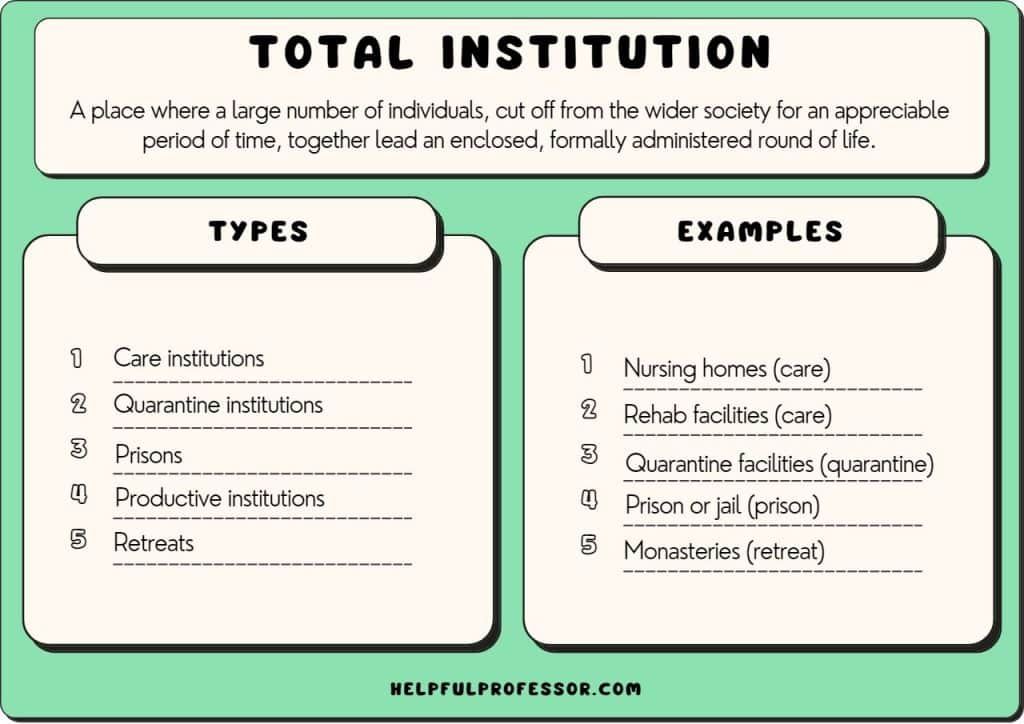In the realm of sociology, the concept of a total institution plays a crucial role in understanding how societies structure and control individual behavior. Total institutions are places where individuals are cut off from the wider community and lead an enclosed, formally administered life. These institutions function under a singular authority and have a significant impact on the identity and behavior of their inhabitants. By examining total institutions, we can gain insights into the mechanisms of social control and the experiences of individuals within these settings. This exploration is vital for comprehending human behavior in extreme environments.
When we ask ourselves, "which of the following is an example of a total institution?" we delve into a diverse array of environments ranging from prisons and mental hospitals to military boot camps and boarding schools. Each of these institutions shares common characteristics, such as the regulation of daily life and the stripping away of individual autonomy. Understanding these features helps us appreciate the complexities of human interaction and the impact these institutions have on individuals.
In this article, we will explore the definition of total institutions, their characteristics, and various examples that qualify under this classification. We will also address the psychological and sociological implications these institutions have on their residents. Ultimately, this knowledge will further enrich our understanding of social structures and their influence on personal identity and social behavior.
What is a Total Institution?
A total institution is defined as a place where individuals are isolated from the broader society and are subjected to the control of a centralized authority. According to sociologist Erving Goffman, who coined the term in his book "Asylums," total institutions are characterized by the following features:
- Isolation from the larger community
- Control over all aspects of daily life
- Standardized rules and regulations
- Loss of individuality and autonomy
Which of the Following is an Example of a Total Institution?
When considering examples of total institutions, several types immediately come to mind:
- Prisons
- Military boot camps
- Mental hospitals
- Convents and monasteries
Each of these institutions embodies the core characteristics of a total institution, where individuals are placed under strict control and are often cut off from their previous social environments.
How Do Total Institutions Affect Identity?
One significant impact of total institutions is the alteration of individual identity. Residents often undergo a process called "depersonalization," where their former identities are stripped away. This process can lead to several psychological effects, including:
- Loss of self-esteem
- Increased dependence on the institution
- Struggles with reintegration into society
What Are the Psychological Implications of Living in a Total Institution?
The psychological implications of residing in a total institution can be profound. Many individuals experience:
- Feelings of helplessness
- Social withdrawal
- Depression and anxiety
These psychological challenges can persist long after individuals leave the institution, affecting their ability to navigate social interactions and establish a sense of normalcy.
Can Total Institutions Lead to Rehabilitation?
While total institutions are often viewed negatively, some argue that they can offer rehabilitation opportunities. For example, structured environments in rehabilitation centers or therapeutic communities can provide:
- Access to mental health services
- Support systems for recovery
- Educational and vocational training
However, the effectiveness of these rehabilitation efforts largely depends on the institution's philosophy and practices.
What Are the Alternatives to Total Institutions?
As society evolves, alternatives to traditional total institutions are being explored. Some alternatives include:
- Community-based treatment programs
- Supportive housing initiatives
- Outpatient therapy options
These alternatives aim to provide care while allowing individuals to maintain their autonomy and connection to the community.
Conclusion: Understanding the Role of Total Institutions in Society
In conclusion, total institutions serve a complex role in society, often embodying both control and support mechanisms. They raise important questions about identity, rehabilitation, and the human experience within structured environments. When we consider "which of the following is an example of a total institution," we not only identify specific settings but also reflect on the broader implications of these institutions on individuals and society as a whole.
By understanding total institutions and their characteristics, we can better appreciate the challenges and dynamics faced by individuals within these settings, leading to more informed discussions about social structures and their impact on human behavior.
You Might Also Like
Unveiling The Legacy Of Warriors: The Intertwined Animals Carved On The Bow And SternCreating Stunning Floral Designs: A Journey Into The Art Of Nature's Beauty
Elia's Journey: Riding To The Beach At A Constant Speed
Bridging The Gap: Providing Transportation For Rural Workers Living In Cities
Exploring The Vibrant World Of Mydesi.net
Article Recommendations
- Mma Fight Share
- Simon Cowell Children
- Alison Neubauer An Exclusive Guide To Her Literary Masterpieces


